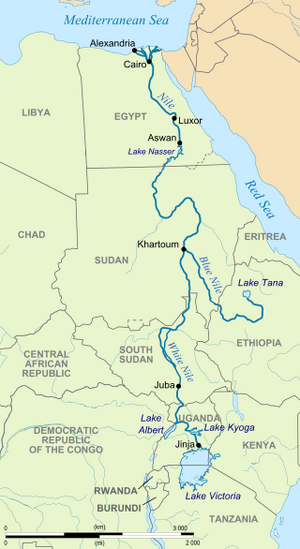Khartoum
| Author:Laxman Burdak, IFS (Retd.) |

Khartoum (Hindi:खरतूम) is the capital and second largest city of Sudan and Khartoum state.
Location
It is located at the confluence of the White Nile, flowing north from Lake Victoria, and the Blue Nile, flowing west from Ethiopia. The location where the two Niles meet is known as "al-Mogran" المقرن, meaning the confluence. The main Nile continues to flow north towards Egypt and the Mediterranean Sea.
Jat clan
Origin of name
The origin of the word Khartoum is uncertain.
- One theory argues that khartoum is derived from Arabic kharṭūm خرطوم meaning 'trunk' or 'hose', probably referring to the narrow strip of land extending between the Blue and White Niles.[1]
- Captain J. A. Grant, who reached Khartoum in 1863 with Captain Speke's expedition, thought that the name was most probably from the Arabic قرطم qurtum, safflower (Carthamus tinctorius), which was cultivated extensively in Egypt for its oil to be used as fuel.[2]
- Some scholars speculate that the word derives from Agartum in the Nubian language, which stands for "the abode of Atum"; the Nubian and Egyptian god of creation.
- Other Beja scholars suggest Khartoum is derived from "Hartooma" which means meeting in the Beja Language.[3]
History
Khartoum was established 24 kms north of the ancient city of Soba in 1821 by Ibrahim Pasha, the son of Egypt's ruler, Muhammad Ali Pasha, who had just incorporated Sudan into his realm. Originally, Khartoum served as an outpost for the Egyptian Army, but the settlement quickly grew into a regional centre of trade. It also became a focal point for the slave trade. Later, it became the administrative center of Sudan and official capital.
References
- ↑ Room, Adrian (2006), Placenames of the World (Second edition)., McFarland. ISBN 0-7864-2248-3. P. 194
- ↑ Walkley, C. E. J. (1935). "THE STORY OF KHARTOUM". Sudan Notes and Records (University of Khartoum) 18 (2): 221–241. doi:10.2307/41710712 (inactive 2015-04-09). JSTOR 41710712.
- ↑ Hasan Shukri, "Khartoum and Tuti 'Shreen Munz Qarnan", Khartoum, 1:11, August 1966, p. 23.

